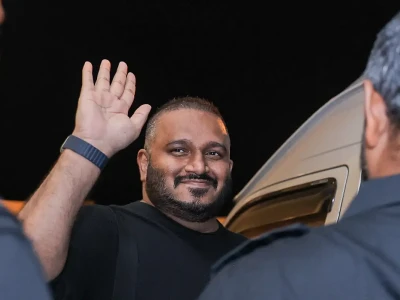
President says consequences must be considered before exercising free speech
"The beginning of one's freedom should not be the end of the other's freedom," the President said.
Top Stories
-
Police lack capacity to monitor released prisoners, attorneys say
-
Court orders risk assessment before deciding on Lamha
-
Faena released after husband takes responsibility for drugs
-
Bassam sentenced to 4 years in jail for misuse of FIFA funds
-
Parliament rejects ex-judge Mahaz despite top committee score
By
Mohamed Muzayyin Nazim
Freedom of expression must be guaranteed, but people must consider the possible consequences before exercising their right to freedom of expression, President Ibrahim Mohamed Solih said Wednesday.
In his speech at a ceremony held at Hulhumale Running Track to hand over the first ever Broadcasting Awards, the President urged journalists to work with responsibility. He guaranteed that freedom of the press will not be obstructed by his administration.
We must not remain in a state of restlessness in anticipating the fate of a neighbouring country to fall on ours. There can be differences of opinion with the government. You can hate me; you can oppose me. However, no one can oppose their country.
President Solih, who had previously served in the broadcasting industry, described the right to speech as an important human rights pillar. He said that "there should be freedom of speech" to bring about positive changes in the world.
"The question is whether there should be a certain standard in the use of this right. It is imperative to disclose opinions and facts on a matter. However, the expressed opinion must garner and issue respect," he said.
"The beginning of one's freedom should not be the end of the other's freedom."
The president said that thinking before speaking is important, not because thinking or speaking is "bad", but because the consequences that can follow are important to consider.
"Responsible journalists must look into whether the consequences of said or written statements are positive or negative. If the right to wave one’s hand ends in a face-slap on the person nearby, then this right is not used properly," he said.
The president also said that no laws are required to regulate responsible journalism. Instead, he said "journalists' code of ethics" is enough.
Noting that journalism in the Maldives needs to be turned over to the next generation with honour, the president said that he believed that many Maldivian journalists are working hard to do so.
"We must not make things out of nothing, or make nothing out of something that is," he said.
The president stressed that the Broadcasting Commission and the Media Council can now operate with freedom, independently.
"There is no room for the government to influence journalism anymore," he said.
President Solih also noted:
-
The defamation law, which shut down journalists during the previous administration, has been repealed.
-
The Evidence Act will be amended to address the concerns of journalists.
The president said that he did not believe that journalism should be "investigated under any circumstances". However, he added that there is still much room for reform in the field.
"There needs to be revisions made to the training and other facilities required. It's not for a particular people, it's for this country. I believe that more needs to be done to provide Maldivian journalists with the necessary skills and training," he said.
Although the president spoke about guaranteeing freedom of expression and press, the government has submitted a bill to the parliament that has the potential to severely restrict free speech. The bill proposed to stop the opposition’s 'India Out' campaign will also pose major obstacles to press freedom.




